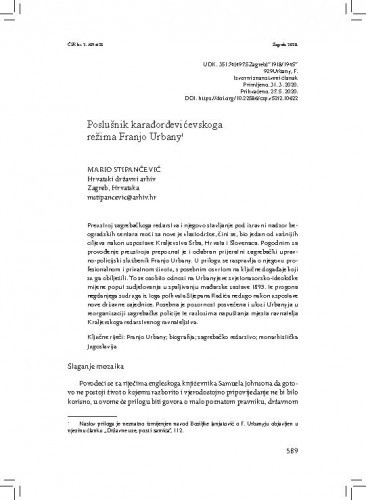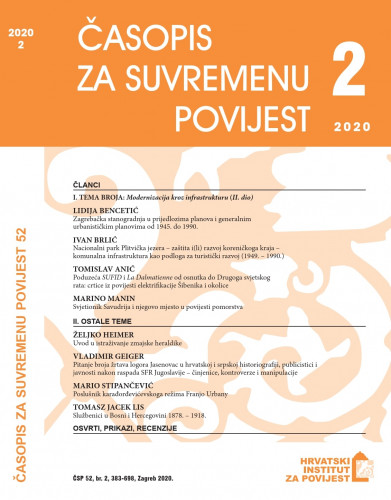Preustroj zagrebačkoga redarstva i njegovo stavljanje pod izravni nadzor beogradskih centara moći za nove je vlastodršce, čini se, bio jedan od važnijih ciljeva nakon uspostave Kraljevstva Srba, Hrvata i Slovenaca. Pogodnim za provođenje preustroja prepoznat je i odabran prijeratni zagrebački upravno-policijski službenik Franjo Urbany. U prilogu se raspravlja o njegovu profesionalnom i privatnom životu, s posebnim osvrtom na ključne događaje koji su ga obilježili. To se osobito odnosi na Urbanyjeve svjetonazorsko-ideološke mijene poput sudjelovanja u spaljivanju mađarske zastave 1895. te progona negdanjega sudruga iz toga pothvata Stjepana Radića nedugo nakon uspostave nove državne zajednice. Posebna je pozornost posvećena i ulozi Urbanyja u reorganizaciji zagrebačke policije te razlozima napuštanja mjesta ravnatelja Kraljevskoga redarstvenog ravnateljstva.; Like his numerous contemporaries from the period of the dissolution of Austria-Hungary and establishment of the new Yugoslav state, Franjo Urbany (1874–1951), a lawyer from Zagreb, General Attorney and police chief of the second-largest city in the Kingdom of Serbs, Croats and Slovenes, had to make a considerable political and ideological U-turn in order to continue his presence in high administrative circles. It would be hard to say whether his personal pre-war views were in opposition to the new situation or not, but there can be little doubt that he wanted to ingratiate himself to the new power-holders. This was a necessity if he were to continue climbing the administrative ladder in the new environment. The difficulty was that Urbany, like many of his kind from the occupying system, had to virtually jump into the lap of those who had been occupied up until that point and – in the new circumstances – were the leading political forces of the state union of which Croatia had suddenly become a member. There can be little doubt that Urbany knew how to adapt. Once a participant in the burning of a Hungarian tricolour at Zagreb’s Jelačić Square in 1895 and a minor administrator of the Austro-Hungarian occupying forces in Serbia during World War I, he became a persecutor of the Croatian opposition and a campaigner for the protection of the centralistic and unitarian Yugoslavian community ruled by the Karađorđević dynasty. These merits provided him with the opportunity to lead and restructure the Zagreb police in the period of 1921–1924. Despite his successes, it appears that the power-holders were in search of a firmer hand for the upcoming times, in order to combat the increasing numbers of dissenters. Because of this, Urbany was forced to resign as the chief of Zagreb’s police and was succeeded by the notorious Janko Bedeković.
Sažetak

 Časopis za suvremenu povijest : 52,2(2020) / glavni i odgovorni urednik, editor-in-chief Zdravka Jelaska Marijan.
Časopis za suvremenu povijest : 52,2(2020) / glavni i odgovorni urednik, editor-in-chief Zdravka Jelaska Marijan.